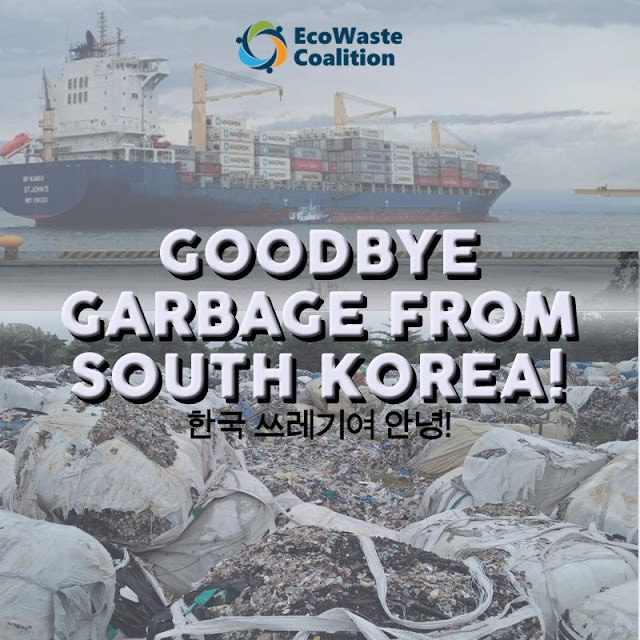Environmental Health and Justice Groups Laud Removal of 7,408 Metric Tons of South Korean Garbage from Misamis Oriental (Protecting the Philippines from illegal waste traffic knows no pandemic, assert groups)
“Goodbye garbage from South Korea.”
The EcoWaste Coalition and other environmental health and justice groups expressed jubilation with the final re-shipment of the remaining containers of illegal trash imports from South Korea amid the COVID-19 pandemic.
As confirmed by the Bureau of Customs (BOC-Region 10) with the EcoWaste Coalition last Friday, the re-exportation of the remaining 43 containers of illegal waste shipments from South Korea (equivalent to 1,036 metric tons) took place on September 15. The wastes were shipped back to Pyeongtaek City from the Mindanao International Container Terminal (MICT Port) in Tagoloan, Misamis Oriental on board container ship BH MAHIA.
The much-awaited repatriation of the remaining wastes raised to 364 the total number of garbage-filled containers returned to South Korea in seven batches starting in January 2019 amounting to a whopping 7,408.46 metric tons.
“We congratulate the Filipino people and government, particularly BOC-10, for successfully insisting on the responsibility of the exporter or the State of export, in accordance with the Basel Convention, to take back hazardous wastes or other wastes deemed to be illegal traffic. The completion of the re-exportation procedures shows that action against waste trafficking knows no pandemic,” said Aileen Lucero, National Coordinator, EcoWaste Coalition.
“As we say goodbye and good riddance to these smuggled wastes, we say ‘bravo’ to the resolute fight waged by our customs and other government officials, together with the civil society, to overcome all the hurdles so as to secure our people’s dignity and well-being," she said.
The EcoWaste Coalition also thanked the government of President Moon Jae-in for honoring its promise to have the illegally exported wastes repatriated as it urged South Korea to take decisive action to prevent the transfer of its waste to the Philippines, including ratifying the Basel Convention Ban Amendment, which forbids the export of hazardous wastes from developed to developing countries.
Davao City-based Interfacing Development Interventions for Sustainability (IDIS) likewise welcomed the departure of the stranded South Korean waste in Mindanao stressing that such a success has underlined the important role of local government units (LGUs) in preventing the dumping of waste from overseas.
“The persistence of the Tagoloan municipal government and the Misamis Oriental provincial government contributed a great deal to the concerted action by the public and private sectors to send back the illegal waste imports and to disallow their disposal locally. It underscores the important role of LGUs in thwarting waste dumping schemes,” said Chinkie Peliño-Golle, Executive Director, IDIS.
For his part, Dr. Joe DiGangi, Senior Science and Technical Adviser of the International Pollutants Elimination Network (IPEN) noted that “the return of illegally exported South Korean waste demonstrates that regulatory enforcement can and must continue during the pandemic. Now the challenge for both the Philippines and South Korea is to ratify the Basel Convention Ban Amendment so that this sad history is not repeated." The EcoWaste Coalition and IDIS are participating organizations of IPEN, a global movement for a toxics-free future.
"Countries should protect themselves from the possibility of adding to their COVID-19 healthcare and plastic waste crisis by doing two things. In the short term, countries should move quickly to ratify the Basel Convention Ban Amendment. In the mid-term, countries should enact a ban on the importation of all wastes," DiGangi pointed out.
Environmental health and justice groups have strongly argued that ratifying the Basel Convention Ban Amendment and imposing a national ban on all waste imports, including electronic, plastic and other hazardous and toxic wastes, are essential to prevent the recurrence of waste dumping and trafficking incidents.
To recall, Verde Soko Philippines Industrial Corporation imported the illegal waste shipments falsely declared as “plastic synthetic flakes” from South Korea, which arrived at the ports in Villanueva and Tagoloan, Misamis Oriental in July and October 2018.
Among the waste materials found in the containerized and bulk shipments were unsorted plastic materials, used dextrose tubes, soiled diapers, discarded electronics and household garbage in violation of the Basel Convention on the Control of Transboundary Movements of Hazardous Wastes and their Disposal and national laws.
Assessed by the authorities as “misdeclared, heterogenous and injurious to public health,” BOC-10 in 2018 then issued warrants of seizure and detention against the said illegal waste imports from South Korea.
BOC-10 further issued a re-exportation order citing violations of DENR Administrative Order 2013-22, which states that “no importation of heterogenous and unsorted plastic materials shall be allowed,” and Republic Act 10863, or the Customs Modernization and Tariff Act.
In August 2019, the EcoWaste Coalition wrote to President Moon Jae-in requesting his government "to immediately act on this pressing issue and not allow the controversy to drag on like what happened to the infamous garbage from Canada that finally left the Philippines after six long years."
Reference:
http://www.basel.int/
http://www.basel.int/Implementation/LegalMatters/BanAmendment/Overview/tabid/1484/Default.aspx
http://overseas.mofa.go.kr/ph-en/brd/m_20312/view.do?seq=14&srchFr=&srchTo=&srchWord=&srchTp=&multi_itm_seq=0&itm_seq_1=0&itm_seq_2=0&company_cd=&company_nm=&page=4






Comments